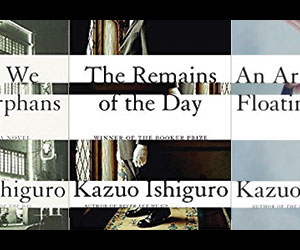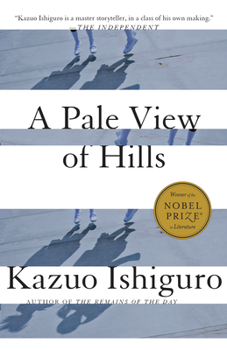A Pale View of Hills
Select Format
Select Condition 
Book Overview
From the winner of the Nobel Prize in Literature and author of the Booker Prize-winning novel The Remains of the Day Here is the story of Etsuko, a Japanese woman now living alone in England, dwelling on the recent suicide of her daughter. In a novel where past and present confuse, she relives scenes of Japan's devastation in the wake of World War II.
Format:Paperback
Language:English
ISBN:067972267X
ISBN13:9780679722670
Release Date:September 1990
Publisher:Vintage
Length:183 Pages
Weight:0.50 lbs.
Dimensions:0.5" x 4.9" x 8.3"
Customer Reviews
4 ratings
Will leave you thinking for weeks afterward
Published by Thriftbooks.com User , 19 years ago
A Pale View of Hills is written as a memoir from the point of view of a Japanese expatriate living in Britain, a woman named Etsuko whose oldest daughter recently has committed suicide. Ostensibly, one would think the memoir, as Etsuko thinks back on her earlier years in post-war Nagasaki, would provide an explanation for her daughter's suicide, but this explanation--and therefore the motivation for the memoir--are not readily apparent. In fact, Ishiguro does not go out of his way in this book to make anything readily apparent. In some ways, this is almost assuredly his writing style, and, in others, it helps the reader to truly feel that one is residing inside Etsuko's mind, privy to her thoughts and experiences without the necessity of direct explanations, which would situate the reader firmly on the outside of Etsuko's experiences, looking in. There is a simplicity and restraint in both narrative and in conversation, which may feel idle and boring to some perhaps, but which to me, at least (based upon what little I know on the subject), came across as evocative of Japanese culture. Ishiguro manages to capture the entire mood of post-war Japan in a series of seemingly idle conversations between Etsuko, her husband, and her father-in-law: the contrast between old ways and new ways, relations between generations and genders within families and in society at large, without coming down firmly on either side of any of these matters and conveying an overwhelmingly guideless, lost feeling as a result. It is no coincidence that Ishiguro chooses to place perhaps the most lost character in the story, a woman named Sachiko, and her effectively motherless daughter, Mariko, in "the one wooden cottage spared the devastation of the bomb and the government's bulldozers." Sachiko does not want to cling to the past represented by her old cottage, nor is she able, despite her efforts, to establish a future in the new world represented so nearby by tall, modern, concrete flats. Again, this contrast between old and new, and people's lost, wandering paths between the two, highlights the character of Japanese culture at the time. There is not much of scenery, particularly in Etsuko's remembrance of Japan. We are, however, talking about post-war Nagasaki, and this lack of scenery may be seen as reflective of the characters' willingness to ignore their surroundings and the pain their surroundings represented. I find it remarkable that every family in the story lost at least one loved one in the devastation of the atomic bomb, but the people of Nagasaki blame only some aspects, at least, of the old ways of Japanese culture, and there seems to be no resentment toward the Americans. I find this remarkable to this day in the real world, in fact, and we have had a recent example of Japanese society's continuing unwillingness to pursue any course of action leaning toward the old ways in the country's heated debate over sending troops to Iraq (although much of the d
A Subtle Portrait Painted by Genius. Extraordinary.
Published by Thriftbooks.com User , 22 years ago
Etsuko's older daughter has recently committed suicide. Living alone in England, Etsuko recalls her encounter with an unusual woman, Sachiko, and her young daughter, Mariko, in Nagasaki a few years after Japan's defeat. Her memories of this summer long ago appeared to have little significance to the present, but gradually the story unravels into two strands, a concrete retelling of distant events and a more oblique revelation about Etusko herself. Ishiguro tantalizes the reader with hints and intimations and vague indications.I realized that Ishiguro is a master of subtlety as I have read some of his other novels, but nonetheless I was unprepared for the obscure ending. What had I just learned? Was this a confused memory or had I glimpsed something macabre? Some rereading helped me resolve my confusion, but I leave the ending for your speculations.In "A Pale View of Hills" Kazuo Ishiguro tells a story, develops convincing characters, and paints a portrait of post-war Japan. Ogata-San, Etsuko's amicable father-in-law, is publicly criticized for teaching patriotism during his long career as a school master. He quietly struggles with the seeming injustice around him. Etsuko's husband, Jiro, is a traditionalist, but has rapidly adapted to the emerging corporate Japan, and simply ignores the recent past. Etsuko's somewhat unbalanced friend, Sachiko, knows that her optimism is unrealistic and that she is jeopardizing her daughter's future, but she continues along a path almost ensured to end in disaster. As for Etsuko herself, her memories only speak obliquely to her views on the American imposition of dmocracy and women's rights. Ishiguro does not moralize, but lets us see post-war Japan through the eyes of his complex characters.Ishiguro could easily have been a writer with only one great book. This haunting story, Ishiguro's first novel, was awarded a literary prize by the Royal Society of Literature. Ishiguro's life had some parallels with "A Pale View of Hills" as he himself was born in Nagasaki in 1954 and immigrated to England in 1960 and it is natural to expect that Ishiguro might have difficulty expanding beyond this "autobiographical" novel. And yet, his second book, "An Artist of the Floating World", was short listed for the prestigious Booker Prize. His third book, the highly successful "The Remains of the Day", captured the Booker Prize for its compelling portrait of an English butler.Ishiguro is a remarkable writer. "A Pale View of Hills" is an extraordinary work of complexity, subtlety, and beauty.
Subtle, Moving Masterpiece
Published by Thriftbooks.com User , 24 years ago
I cannot recommend this book highly enough. The reviewers below have summarized the basic elements, so let me concentrate on style. If you enjoy books that do not have to be big on plot or action, but are instead beautifully crafted, realistic depictions of the profundities of life, with a strong atmospheric sense, then I am sure you will enjoy this subtle work. It is very short and easy to read, with the terse, clear style that made Ishiguro famous. Japanese readers will find the dialogue and characters and setting to be completely believable -- despite the fact that Ishiguro never went back to Japan before writing this novel (he grew up in England). Yet many people finish this book without really having grasped much of its essence.The difficulty lies in drawing connections between events, characters and symbols. Some of them are interrelated within the work, others draw upon outside references (such as the symbolism of crossing the river being a metaphor for death, like the river Styx). This book is simply written enough to be enjoyed the first time, and yet complex enough to be read another two times. The remarkable thing is that when re-read (or read the first time, with an eye on grasping the symbolism and motifs) this book is actually not only a tragic tale, but a terrifying and disturbing one in its dark images of death, neglect and loss.Readers of Ishiguro's other books may find this closest in style to "Artist of the Floating World", yet farthest from "The Unconsoled". In style, Ishiguro mastered this particular technique in "The Remains of the Day", which is also a book about loss, but with a romantic twist thrown in, and far less troubling that this earlier work. Read this book, and if it doesn't touch something in you - read it again.
The beauty of restraint
Published by Thriftbooks.com User , 24 years ago
Ishiguro achieved this incredible debut novel by holding in the reins and managing to tell only what he felt necessary. The story tells of a Japanese lady, Etsuko, now living in England. Her first daughter, Keiko, has committed suicide by hanging herself, alone, in a flat in Manchester. It is the story of Etsuko looking back through her memories, trying to make sense of what happened, trying to pull some ends together. But we, just like she, are left unsure. She finds some answers but even more questions. Ishiguro has brilliantly transported us into the world of memory, dream, illusion. In her search for answers, Etsuko looks back at her life in Nagasaki less than a decade after the devastation of the atomic bomb. Typically, Ishiguro chooses not to look at this event directly. Instead he presents us with the disturbed and confused lives of those who survived. There is Mrs Fujiwara, bravely running a noodle shop, trying to be positive even though her husband and nearly all her children were killed. There is Etsuko's father-in-law, a teacher before and during the war who is struggling to come to terms with living in a society where everything he lived for is written off as evil brainwashing. Japan is trying to wash its hands clean of his type, and yet he appears such a decent and fair person. These characters are just the background to the main story but they are so brilliantly drawn. I shall not even try to clarify Etsuko's search for reasons. Let yourself be taken into her elegaic but ultimately futile look at her life in Japan before she left. The main issue underlying this story is the question of searching for self-fulfilment or submitting oneself to the restrictions of the society in which one lives. This is a dark novel, and I felt the pain in this novel so much more on a second reading. This should however by no means deter you from reading it. The language is so beautiful and delicate that it will carry you through. It is not a novel to try to solve, instead it is one to submit yourself to, and let it work its wonders on you. Like me, you may well find yourself returning to it a second time. I'm very sure I will be returning to it again, and I'm also sure there will be yet more there for me next time.
A Pale View of Hills Mentions in Our Blog

Artful Artifice: 10 Brain-Bending Novels with Unreliable Narrators
Published by Ashly Moore Sheldon • September 06, 2022
Books with unreliable narrators are the literary equivalent of the sand shifting under our feet. Told from the POV of characters who can't (or won't) provide a complete or accurate account, they are, at once, both bewildering and thrilling. If you like this kind of story, here are ten great titles to consider.

Kazuo Ishiguro Wins 2017 Nobel Prize in Literature
Published by Bianca Smith • October 18, 2017
Last week author, Kazuo Ishiguro received a call most only dream of - he won the 2017 Nobel Prize in Literature!






